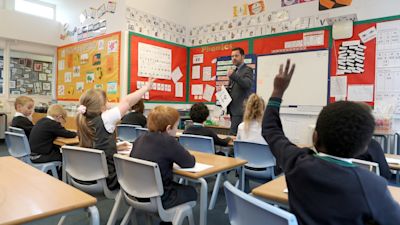Covid: Students lost one-in-three days of schooling during coronavirus pandemic year across UK, study finds

School pupils across the UK have lost out on one-third of their learning time amid Covid-19 – even when home lessons are taken into account, a study suggests.
The poorest pupils suffered larger learning losses than their richer peers amid the pandemic, according to researchers from the London School of Economics and Political Science (LSE) and the University of Exeter.
Considering learning undertaken at home and in the classroom, the analysis suggests pupils in England on average lost 61 days of schooling between March 2020 and April 2021. The usual school year is 190 days.
Larger average losses occurred in Scotland (64 days) and Wales (66 days), while pupils in Northern Ireland also lost 61 days.
One in 20 pupils absent from school amid spike in Covid cases
'Our elderly have been protected from Covid but often our youngest have been forgotten'
The report suggests that the poorest pupils in England lost 34.9% of their learning during the second round of school closures in 2021 – less than the most affluent pupils in the rest of the UK who lost 38.6% of learning time.
Researchers calculated the education loss by assessing school opening and closure dates, official school attendance figures, and data on daily learning rates (combining home and classroom learning) reported by parents.
LSE professor Stephen Machin, CEP director and co-author of the report, said: “Even a few days extra learning loss can have a large impact on educational achievement and life outcomes, and these are big losses of around 60-65 days.
“Learning losses suffered during the pandemic are manifested in stark gaps in attainment between children from poorer backgrounds and their more privileged counterparts, which is likely to cause a significant decline in social mobility for younger generations”.
Listen to our coronavirus podcast:
The findings come after the latest government figures show that more than 640,000 pupils in England were not in school due to Covid-19 last week – up from around 384,000 the week before.
Current rules state that children have to self-isolate for 10 days if another pupil in their bubble – which can be an entire year group at secondary school – tests positive for coronavirus.
But updated Department for Education (DfE) guidance says keeping children in consistent bubbles will not be needed for summer provision, or in the autumn.
The report, from the LSE’s Centre for Economic Performance (CEP), found that just over half (53%) of 10,000 adults surveyed support extending the school day to make up for learning losses.
More than two-in-three (68%) respondents in England support allowing greater flexibility for pupils to repeat a whole school year so they can catch up.
A government spokesperson said: “We have committed to an ambitious, and long-term education recovery plan, including an investment to date of over £3 billion and a significant expansion of our tutoring programme, to support children and young people to make up for learning lost during the pandemic”.